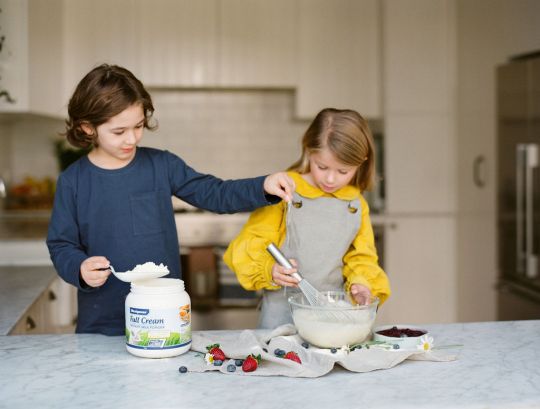
Blog BY staff | 19 August 2019
Skills children learn while cooking

Cooking is a great aid in helping not only teach your children about food but also help develop important life skills. It can either be cooking a meal or making an activity out of cooking to teach them vital health behaviors but also will help build different aspects based on the age group at hand. Allowing them to have a conversation about food and the many questions they have in understanding where it comes from, types of food and many other topics, will give the opportunity to grow and create a sense of wonder.
Motor skills
From as early as toddlers to adolescents having your children in the kitchen will help develop fine motor skills. Things such as whisking, pouring, sifting, measuring and rolling are just some of the motor skills they will learn. With each achievement you can continue adding new movements and complexity to what they can do in the kitchen and preparing a meal. Along with building understanding of their senses of taste, smell and sight, they will build personal preferences and knowledge with sweet, savory and sour flavours.
Literacy
Having them read the recipe exposes children to reading words they may not find in their usual books, builds their vocabulary and it also builds on their math knowledge and problem solving. Reading and seeing measurements and different types of quantities and addition at a young age helps them gain a head start in learning division. Also, this style of reading and step by step process also builds on understanding a process and an order.
Hygiene
Having children in the kitchen will help build an understanding for the importance of hygiene in relation to both personal and food. Having them always wash their hands before touching food, tying hair back and teaching them why you can’t mix foods because of contamination, allows them to gain a sense of responsibility when preparing food for themselves and others.
Emotional development
Cooking can help children build self-confidence and gain a sense of accomplishment. Even if it may not turn out exactly as the recipe states, by praising them and letting them know they did a great job and their efforts are appreciated. It will build the skill of teamwork and active listening to the people around them. Helping them understand how to work together, share and cooperation to get an end result.
Importance of healthy food
Ultimately while they are gaining all these other skills, they are also building an appreciation and understanding for a healthy lifestyle and food. They will learn different cultural lessons in the food they are exposed to and understand the process of farm to plate. Learning the importance of the food groups, macronutrients and what sometimes food is, implement behaviours and can help create a way of thinking towards food and build a healthy relationship with it. Allowing them to prepare and make their own food also helps encourage an appetite and they will more than likely finish everything on their plate as a form of accomplishment knowing they made it.
A children’s biggest learning with food is around family and caregivers. Teaching children about food and the kitchen will provide them with knowledge and skills that will last a lifetime. It is at this age that all aspects of development and creativity are absorbed and can make a difference into adulthood.
